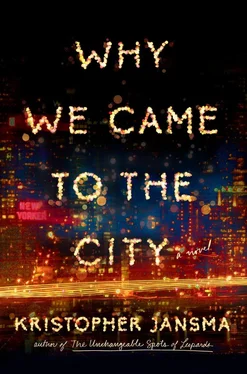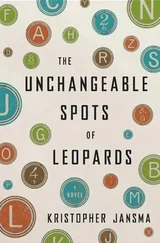Dancing late into the night, for hours without slowing down, as the older folks steadily said their goodbyes and returned to their rooms, the young folks felt more and more free. All past time seemed to disappear, and friends who had long ago dated and ended things awkwardly were seen boogying to the band’s cover of Sisqo’s “Thong Song” in utter violation of all normal rules of engagement. At one point Jacob somehow successfully swung Sara between his legs during “Take the A Train,” and he and George got up and did their old air guitar routine to “Paradise City,” and when the lights, finally, blasphemously, came up after Zacharie’s fifth warning that they were past their contracted usage of the space, there were cries from all around to keep the party moving — to grab their wedding favors (custom-monogrammed shot glasses) and take the action down the road to the Turtle Bay Saloon or the new Midtown 3015 nightclub.
But George and Sara knew it was time for them to call it a night and let the others go on without them. She got out her bouquet, and all the single women crowded around to play catch, but Sara expertly rocketed the flowers right where she wanted them to go: over Eddy’s head and into Beth’s waiting hands. Bull’s-eye.
Then Sara grabbed George’s hand, and they left: barraged in their exit by catcalls, cheers, well-wishes, and charmingly lewd comments. Someone (top suspect: Jacob) threw a condom at George, which missed and got lost in a chandelier. It was up there with William’s hat, flung excitely during “Under Pressure.” Zacharie was on it already. Sara had already made both Jacob and William agree they’d all get together soon after the honeymoon so she could give them their souvenirs. There was talk of brunch, and George knew she would make it happen.
Then alone together at last in the elevator, George and Sara fell into each other’s arms, kissing rhapsodic and hungry, chasing the tail end of the evening’s high, fumbling with the cuff links and hairpins that still restrained them. They managed to find their way blindly into the bridal suite, which had been cleaned and filled with fruit baskets and flowers and chocolates and two more bottles of champagne in ice buckets. They bypassed these and found, finally, the enormously wide bed; the last hook on her gown; the buckle on his vest; the wedding night underwear, so carefully picked out by Sara’s sisters — soon removed and flung far in their flurry. Grasping, giddy, they pawed at each other’s bodies as if they were brand-new. Floating on an ocean of down comfort and the scent of lilacs and the wide constellation of city lights outside their flagrantly opened curtains, George and Sara made love as they hadn’t in months — or honestly, years — love like neither of them could specifically recall having made in the early days of their relationship but that they were equally certain they had made. And as they pressed their heads together on the pillow and closed their eyes and lost sight of the other for the first time since the morning, they both felt that things were right and good, and that everything they’d been through had led them to this place at last.
• • •
It was still dark in the room when Sara woke up. Lights from the neighboring buildings shone through the open curtains and made gray shapes upon the bed. Which was empty, except for her. She rose slowly and walked to the door, which had been carefully closed just to the point where the latch didn’t spring into the hole and make a noise that might wake her. She eased it slowly open. A flickering light cast on her bare toes and the rug beneath them. She looked up, knowing what she was about to see because she had seen it before so many times. The television was on, volume down low to a commercial for dish soap in Spanish. There on the couch, completely naked, empty bottle of complimentary champagne beside him, was George — her husband, George — sound asleep. And on the couch beside him, under one of his arms, was the dull metal urn containing Irene’s ashes. Just as she did most nights, Sara tiptoed into the room, willing herself not to cry, and gently lifted George’s arm from the urn. In the morning he wouldn’t remember taking it out of the bowling ball bag, just as most mornings he didn’t remember taking it off the mantel and putting it on the couch cushion beside him, as if she were somehow watching.
• • •
From his blue beach towel, George spent hours watching the yachts and cruise ships moving back and forth across the glassy surface of the Golfe de la Napoule. Every fifteen minutes Sara’s cell phone would vibrate, and over on her own adjacent blue towel, she would rotate. Once an hour she would sit up and apply a fresh coat of lotion to her arms and legs, wordlessly leaning over toward George so that he could do her back. That morning she had gone for a five-mile run on the beach, except she’d gotten caught up in it and done seven. After a quick dip she’d eaten half a sandwich for lunch and plopped down onto the towel to rest and try to get some color. George tried not to stare at the topless French women just down the beach. The white sand was almost polka-dotted with rosy little nipples. You sort of got used to it, after a while. Sara wondered how many more lavender lemonade spritzers the waiter boy would have to bring before she’d unhook her bikini top. “I don’t see the problem,” George had said an hour earlier, maybe two, as he’d reapplied her lotion. “Personally I like a nice tan line.”
“Oh you do, do you?”
“Yes,” he said decisively. “Like a frame around a painting. Makes them look official.”
“I think I might take my top off,” Sara said.
“Okay.” George reached to the hook.
“Not yet,” she said, batting his hand away. “I meant later.”
“Okay,” George said, capping the lotion and watching Sara flop down again.
Up and down the beach, George saw other couples sitting just as he and Sara were, some talking, some not talking. It was early in the travel season, and the beach wasn’t crowded. Little tables sat empty, with umbrellas open to shade the vacancies beneath them. Everyone was quiet, except once in a while a group of students would pass by, at least five or six speaking loudly in Czech or Swedish or Polish. Sara thought it was probably Europe’s spring break. There had been a lot more of them around last night, wearing cheap wristbands and neon-banded sunglasses and sneakers without socks or laces.
Suddenly Sara sat up, businesslike, a good ten minutes before her timer would go off.
“Hi,” George said quickly. “This is nice, isn’t it?”
“I think we should take our hike to scatter Irene’s ashes tomorrow.”
He was surprised. “I thought — we had it planned for the, um, end of the week, after Monte Carlo and all that.”
“I think we need to get it out of the way. Don’t you feel like it’s sort of hanging over us? As nice as this all is, I can’t quite relax.”
She could tell that George was annoyed, possibly even a little upset. Which was just as she’d suspected all along — he really didn’t want to scatter her ashes. Maybe even he was hoping that by the end of their ten days in France, he’d be able to persuade Sara to abandon the plan. Here he was, trying to wallow in the waist-deep water, and she was going to make him go right ahead and cannonball into the deep end of the pool? But she couldn’t take it anymore. The sulking, the despondency, the pondering. He was a born problem solver, a doer of puzzles. And she believed in him. She believed he would comb through the data on 237 Lyrae V and correctly identify the variables and reengineer his hypotheses until they were tested and proven. He would discover great things, but this — this couldn’t be solved. The answer to grief didn’t lie in the appendix of a philosophy book or even in Ecclesiastes. He would never be able to drink enough scotch, or stay up late enough on the couch, to unravel it. X equaled nothing. Not zero, nothing. X equaled a waste of time. But what could make him see that? What could make him let it — her — go? Day by day she tried to make their love the greater problem to be solved.
Читать дальше












